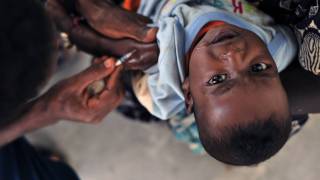Travel-Related Vaccines for Children

Of the 73 million Americans who traveled internationally last year, 1.9 million were children. And most were not vaccinated.
New research found 53 percent adults who were recommended to get a measles vaccination before traveling, did not do so.
Of the people who weren't vaccinated, 74 percent ‘said they were not concerned’.
"Pre-travel vaccinations are important because diseases that aren't found in the United States, such as typhoid or yellow fever, may be a risk in other countries," said Dr. Phyllis Kozarsky, with the Centers for Disease Control and Prevention's (CDC) Travelers' Health Branch and Emory University.
"Several countries in Europe are currently experiencing measles outbreaks, which emphasizes how important it is for travelers to be up-to-date on routine vaccines as well as get travel-related vaccines,” said Dr. Kozarsky.
Additionally, researchers have found that travel-related infections affect children disproportionately more than adults.
Toddlers, for instance, are at greater risk of infections relative to older children because of their underdeveloped immune systems, they often come in direct contact with contaminated objects with their mouths, and of their limited ability to communicate symptoms.
Since many families do not visit a physician before departure, pharmacists can play an important role in enabling their customers, and children, avoid travel related illness while on vaccination, and when they return home.
Travel consultation with a pharmacist is an ideal opportunity to ensure routine childhood immunizations are up to date. In some instances, vaccines can be administered at an early age, but guidelines exist for altering vaccine schedules, if required.
In all cases, the local vaccination schedule and the travelers doctor should be consulted.
Pre-travel counseling should be guided by the travel destination, pre-existing conditions, whether the trip is for visiting friends and relatives (VFR), and other specific risk factors.
As opposed to normal tourism, trips for VFR are associated with a longer duration of stay, more interactions with the local community, and more exposure to local food, water, and animals.
Infections in the pediatric population can range from mild, self-limited symptoms to life-threatening disease.
Furthermore, travelers going for VFR often do not take necessary prophylactic medications for serious infections, such as malaria, due to the mistaken belief that they are protected by virtue of originally living in that region.
Whenever possible, children should complete the routine immunizations of childhood on a normal schedule.
However, not all travel-related vaccines are effective in infants, and some are specifically contraindicated.
Maternal antibodies can interfere with an infant’s ability to develop their own antibodies to vaccines.
According to the CDC, there are a myriad of infectious syndromes that can affect children who travel abroad, such as:
- Traveler’s diarrhea is the most common form of gastrointestinal illness among children traveling outside the United States, accounting for 23% of all travel-related illness.
- The World Health Organization reported that malaria was responsible for over 400,000 deaths in 2015; 90% of these occurred in sub-Saharan Africa. Seventy percent of deaths were among children less than aged 5 years of age.
- Dengue Fever is the second most common cause of nonspecific fever after malaria. Reports indicate up to 390 million people may be infected with dengue annually. A recently developed vaccine, Dengvaxia (CYD-TDV), has been approved for use in some countries and for patients aged 9 to 45 years.
- Typhoid fever is one of the most common vaccine-preventable illnesses among traveling children, and it is acquired primarily through contaminated food and water sources. A vast majority (80%) of typhoid cases in persons who have traveled to Southern Asia.
- Children should receive routine vaccination for hepatitis A and hepatitis B viruses. Because of the potential interference by maternal antibodies, the hepatitis A vaccine is not approved for children aged younger than 1 year. The vaccine series consists of 2 doses ≥6 months apart. Hepatitis B vaccine can be administered with an accelerated schedule of 4 doses of vaccine given at 0, 1, 2, and 12 months; the last dose may be given on return from travel.
In summary, these researchers report that pharmacists can play a key role in providing travel-related information and can administer preventive vaccines.
Vaccine travel advice should be based on region, trip duration, age-related aspects of prevention, and coordination with other health practitioners are important factors to consider in pharmacist counseling.
Moreover, there is usually plenty of time for pre-travel pharmacist counseling. According to the Department of Commerce, advance trip decision time increased to an average of 102 days.
The top five destination countries visited by U.S. residents in 2015 were:
- Mexico (28.7 million)
- Canada (12.5 million)
- United Kingdom (2.9 million)
- Dominican Republic (2.8 million)
- France (2.4 million).
Although Asia and Africa make up less than 25% of all international destinations, travel-related illnesses occur more frequently within these regions.
Since the cost of vaccines is a major limiting factor, vaccine discounts can be found at this webpage.
The researchers did not disclose any conflicts of interest: Malini Ghoshal, RPh, MS President, Inspirra Healthcare Inc.; Sanjat Kanjilal MD, MPH, Instructor, Harvard Medical School, Assistant in Medicine, Massachusetts General Hospital, Board Certified Internal Medicine, Infectious Disease.
This work was supported by CDC grants U19CI000514 and U01CK000175, by the National Institutes of Health (K01 HL123349).
Our Trust Standards: Medical Advisory Committee
- Travel-Related Infection in Children: Pretravel Counseling to Reduce Morbidity
- National Travel and Tourism Office. U.S. citizen international outbound travel up eight percent in 2015. March 21 2016
- Traveling with Children
- U.S. Resident Travel to International Destinations Increased Nine Percent in 2015
- A “Syndromic” Approach for Diagnosing and Managing Travel-Related Infectious Diseases in Children
- Illness in children after international travel: analysis from the GeoSentinel Surveillance Network.
- Missed Opportunities for Measles, Mumps, Rubella Vaccination Among Departing U.S. Adult Travelers Receiving Pretravel Health Con

























